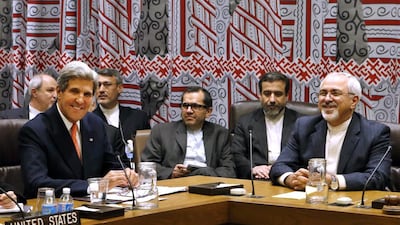A few hours after American TV networks called the presidential election for Democratic candidate Joe Biden, Iran's Foreign Minister Javad Zarif published the following tweet: "A sincere message to our neighbours: [Donald] Trump's gone in 70 days. But we'll remain here forever. Betting on outsiders to provide security is never a good gamble. We extend our hand to our neighbours for dialogue to resolve differences. Only together can we build a better future for all."
It is a commendable sentiment, of course. Who does not want the region’s rivalries to end? They have caused untold misery, suffering and displacement for the peoples of the Middle East, from Yemen to Iraq, Syria, Lebanon and Libya. Quarrels with neighbours are bad for trade and distract from the primary goal that the region’s governments ought to set for themselves – making the lives of their citizens better in every measurable way.
The problem for Mr Zarif’s neighbours, however, is not Iran’s existence. Most of the country’s neighbours continue to engage with it on a variety of economic and diplomatic matters, even if they oppose its expansionist policies precisely because you can’t really do anything about the hand that fate deals you when it comes to your geography. Co-existence is paramount because nobody wants destructive wars.

The problem for Iran's adversaries is that when Mr Zarif says "we'll remain here forever", in practice "here" does not mean within the confines of his country's borders. "Here" means Iraq, Syria, Lebanon and Yemen.
Mr Zarif's comment indicates that Tehran is banking on the change in leadership in Washington bringing relief to Iran's battered economy, which has suffered under round after round of sanctions imposed by the Trump administration.
Under former president Barack Obama, in whose administration Mr Biden was vice president, the US signed a nuclear deal with Iran that limited its capacity to produce nuclear weapons. The negotiations bypassed America’s allies in the region and had no provisions to limit Iran’s expansionist behaviour in neighbouring countries and beyond.
While the goal of ensuring that the Middle East remains a nuclear weapons-free zone is commendable, it provided a windfall in the tens of billions of dollars to Iran to allow it to continue its support for militias and non-state actors across the region, which it did with gusto. It continued to support militias in Iraq that committed atrocities like extrajudicial killings and forced displacement. It continued to fund Hezbollah, which reigns supreme in Lebanon and intervened to save the regime of Bashar Al Assad in Syria. It extended billions of dollars in credit and assistance to Mr Al Assad's regime and backed a transnational alliance of Shiite militias that underpinned the Syrian dictator's scorched earth genocidal campaign to reclaim the country, leaving half a million dead and half the country displaced in its wake.
Mr Trump pulled out of the nuclear deal and prosecuted a campaign of maximum pressure on Tehran, imposing the most stringent sanctions regime possibly in history. He assassinated Qassem Suleimani, the second-most powerful man in Iran and commander of its external military operations. But there was no real endgame to his efforts, and no real attempt at engagement. He pulled back from the option of military strikes after a shocking and brazen attack on Saudi Arabia's oil facilities that was widely believed to have been carried out by Tehran.
It is too early to discern how the Biden administration will deal with Iran. In the reporting on the first round of executive orders that he will issue, such as rejoining the Paris climate agreement and the World Health Organisation and lifting the Muslim ban, it is notable that rejoining the nuclear agreement and lifting sanctions are not among them (yet).
Indeed, it is too early to predict whether Mr Biden will be Obama 2.0 on foreign policy. The former president's legacy abroad was marred by fateful decisions like his refusal to intervene in Syria, a conflict that has destabilised the region and the West, which responded to the influx of refugees with the rise of right-wing populists such as Mr Trump who strove to undo Mr Obama's legacy.
The Biden administration will bring necessary sanity to American foreign policy on many fronts, including hopefully a return to multilateral co-operation on defining global challenges such as fighting climate change, public health, combating the coronavirus pandemic and making vaccines widely available, re-engaging on Syria, and nuclear non-proliferation, among others.

On the question of Iran, it must seek to mediate between regional powers to preserve the peace. But it must also recognise that that peace cannot be achieved piecemeal. The nuclear agreement did not magically turn Iran into a responsible international actor. Instead, it used part of the windfall to continue funding its regional hegemonic ambitions, creating new or exacerbating existing conflict zones and fuelling a new cycle of tensions with its neighbours, for which the region’s populations – including Iranians – have paid a heavy price.
This is both a challenge and an opportunity. It is a challenge because the region’s dynamics, power plays and competing ambitions do not lend themselves to easy solutions. But it is an opportunity because, if done right, it can bring an end to the bloodshed that has riven the region in recent years. It can also set forth a vision of enduring peace in several countries that have paid the price for these rivalries.
Kareem Shaheen is a veteran Middle East correspondent in Canada and a columnist for The National




















